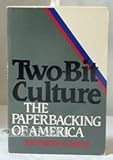
I just finished this book: Two-Bit Culture: The Paperbacking of America, by Kenneth C. Davis, and I would heartily recommend it. It is dated, to be sure, as it was published in 1982, but the story of the Paperback Revolution that Davis chronicles is fascinating, with plenty of stories from the women and men at the forefront of 20th century American publishing.
As I got to the end, I was struck by how in agreement I was with so much of what Davis wrote over 25 years ago:
The paperback business in the 1980s is characterized by a failure of nerve an creativity. The result is a monthly outpouring of "lists" highlighted by artless imitation, a frightful lack of imagination, crass pandering to lowest-common-denominator tastes, and a slavish adherence to supposedly sound management practices that limit creativity and risk taking... [he goes on to talk about all the corporate consolidation of hardcover and paperback houses]
All of this has led to a fearfully homogenized output from American publishers. Always an imitative field, publishing - paperback publishing in particular - has become dominated by me-too-ism and an alarming dependence on ephemera. There are successes today, but where are the books that will still be read five, ten, or twenty years from today?... Ian Ballantine, the crafty old pioneer of the paperback who is still actively pursuing paperback projects, graphically described the problem as "publishers devouring each other's genitals."
Davis later nails the future - the future! - in this section of the final paragraph of the 1982 book:
Can such a revolution come again? Certainly. But it is likely that the paperback will not be the vehicle driving it. Perhaps books will play only a small role in the next wave. One vision of the future rests with the twelve-year-old who is not merely playing with a computer but programming it. The time has come when the computer has begun to take the raw materials of the Paperback Revolution - low production costs, accessibility, and inexpensive materials or software - to make a new and probably more radical revolution. One can only hope that there are people wise enough to take these elements and see what can be made of them.
Quite a charge! It might be a good start to get the history. Find this book at a library or used bookstore (as I did).
1 comment:
Unless the hardcover is Champlain's America!
Post a Comment